|
|
|
Sort Order |
|
|
|
Items / Page
|
|
|
|
|
|
|
| Srl | Item |
| 1 |
ID:
151100
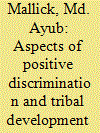

|
|
|
|
|
| Summary/Abstract |
Protective policies are essential for individual development and group mobility.
Positive discriminatory efforts seek to reduce group inequalities and to rectify
the consequences of group discrimination. Reservations in the fields of politics,
education and employment aimed at protecting tribal culture and tradition have
achieved strikingly little. Protection of land and life support system has been
poorly implemented. There have been no marked improvements in their social
conditions. Planned intervention has not improved the occupational and educational
levels of tribals. Non-tribals do not treat them equally. Apart from developing
entrepreneurship, follow-up action in providing developmental benefits to
tribals should be made. The single-stroke formula of providing loans and facilities
is unsuited to the development needs of the area. Social capital formation
is needed to ensure justice, or to provide socio-economic justice, which was
traditionally present in the tribal economy and society.
|
|
|
|
|
|
|
|
|
|
|
|
|
|
|
|
| 2 |
ID:
129539
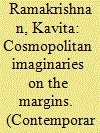

|
|
|
|
|
| Publication |
2014.
|
| Summary/Abstract |
In this article, I examine how social boundaries are drawn and contested by residents in a Delhi resettlement colony, established in 2004 and expanded during the wider slum clearance drive, prior to the 2010 Commonwealth Games. Drawing from life narratives, I explore how residents navigate new social terrains and decide in which situations difference becomes a salient issue. Building on literature that engages with subaltern forms of cosmopolitanism, I argue that openness and conviviality are seen as predominantly urban behaviors, external to that of the colony located on the margins of the city. Residents instead express ambivalent and sometimes contradictory subjectivities in quotidian encounters, and often see social distancing as a necessary tactic. I suggest the narratives offer a nuanced understanding of the multiple constructions of home, community, and belonging amongst the marginalized in and 'beyond' the city.
|
|
|
|
|
|
|
|
|
|
|
|
|
|
|
|
| 3 |
ID:
091711
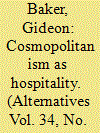

|
|
|
|
|
| Publication |
2009.
|
| Summary/Abstract |
For many cosmopolitans, an emergent global civil society is reframing the relationship between the universal and particular in world politics in ways that do justice to both. This article disputes this claim, finding that the concept of global civil society shares the same fundamental problem as state sovereignty, namely that it is better at articulating global identity than difference because it reproduces in different form statist attempts to describe a universal structure of particularity. It then argues that to avoid reducing difference to identity while remaining true to the cosmopolitan impulse to ethical universality, that is, to recognition of moral obligations to foreigners, it is necessary to take cosmopolitanism as synonymous with an ethics of hospitality enabling a nondialectical account of identity and difference in cosmopolitanism. As Derrida affirms, hospitality deconstructs the binary of identity and difference in our ethical relations with strangers. This dialectic-defying quality of cosmopolitanism-as-hospitality requires a greater decisionism than dialectical liberal-cosmopolitanism, turning cosmopolitanism away from the pure ethics of its liberal variants and transforming it into an ethicopolitics.
|
|
|
|
|
|
|
|
|
|
|
|
|
|
|
|
| 4 |
ID:
164029
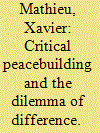

|
|
|
|
|
| Summary/Abstract |
Recent research has revealed the need to include and understand local actors in order to improve the effectiveness of peacebuilding. According to these analyses, peacebuilding could become more respectful of cultural differences thanks to a genuine engagement with the specificities of the local. Empirical studies of the ‘different’ local have thus flourished in the field with the ambition of countering the universalist tendency of traditional peacebuilding. Through the use of the concept of ‘dilemma of difference’, this article challenges this intuitive argument and argues that these approaches risk reproducing a stigma attached to the ‘different’ local. Indeed, emphasising difference in order to ensure its respect means separating and reifying ‘it’ as a deviation from the norm(al). As such, this analytical strategy is likely to recreate the stigma that contributed to the exclusion of local actors in previous peacebuilding practice and research. In contrast, I outline three strategies for studying difference differently in peacebuilding: focusing on the institutional arrangements that enabled specific differences to emerge and become visible; recognising that these differences are internal to peacebuilding (and thus an unlikely source of alternative and emancipation); and revealing the unstated and implicit Self for/from whom local difference is relevant.
|
|
|
|
|
|
|
|
|
|
|
|
|
|
|
|
| 5 |
ID:
111559
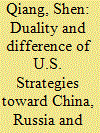

|
|
|
|
|
| Publication |
2011.
|
| Summary/Abstract |
Globalization has complicated the strategic interests of major powers: integration of their strategic interests leads to their cooperation and interdependence on the one hand, and conflicts of their strategic interests result in their frictions and competitions on the other. The U.S. will try to maximize its strategic interests by utilizing its constructive cooperation with China, Russia and India on the one hand and, on the other hand, seek global and regional hegemony to contain and prevent the three countries from growing strong to become challenges to its hegemonic status. The U.S. strategies toward China, Russia and India are dual and different in degrees and contents. The U.S. will continue to hedge its bets on both the positive and negative sides of its strategies in the future.
|
|
|
|
|
|
|
|
|
|
|
|
|
|
|
|
| 6 |
ID:
126702
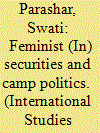

|
|
|
|
|
| Publication |
2013.
|
| Summary/Abstract |
Forum: The State of Feminist Security Studies: Continuing the Conversation. This forum comprises seven pieces conceived in response to the recent Politics & Gender Critical Perspectives section that featured contributions from Carol Cohn, Valerie Hudson, Jennifer Lobasz, Laura Sjoberg, Ann Tickner, Annick Wibben, and Lauren Wilcox (P&G 2011, Vol. 7, Issue 4). Throughout, we refer to this collection as "the CP section."
|
|
|
|
|
|
|
|
|
|
|
|
|
|
|
|
| 7 |
ID:
172164
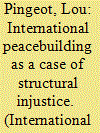

|
|
|
|
|
| Summary/Abstract |
In the face of the repeated failure of international peacebuilding to build peace, one strand of the literature argues that failure can only be understood by ‘zooming in’ – by focusing on peacebuilders, the local populations they purport to help, and the relationship between them. This article draws on the insights of this literature to argue that international peacebuilding should be understood as an instance of structural injustice. Studies of the encounter between international interveners and local populations tend to focus on the differences between these groups and their problematic relationship. I argue that ‘zooming in’ reveals much more than the differences between interveners and locals: it uncovers how their relationship presents parallels and similarities with others, such as the relation between colonizers and colonized. The relationship between internationals and locals is problematic not because of each group’s characteristics and their difference, but because of the social positions they relate from. These hierarchical social positions give some groups the power to intervene in the lives of others. The article argues that the encounter between internationals and locals should be ‘de-exoticized’ and that hierarchy, rather than difference, should be at the centre of the critical peacebuilding literature.
|
|
|
|
|
|
|
|
|
|
|
|
|
|
|
|
| 8 |
ID:
152337
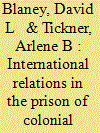

|
|
|
|
|
| Summary/Abstract |
This article argues that Justin Rosenberg’s proposal to reground IR in an ontology of societal multiplicity fails to account for the practices by which the field has erased multiplicity from its register and has sustained its identity through suppression of difference. We posit that the prison of colonial modernity, more than that of Political Science, is at the root of IR’s lack of a distinctive purpose, and that Rosenberg’s gesture toward uneven and combined development (UCD) as a sorely needed ‘big idea’ is insufficient for the jail break.
|
|
|
|
|
|
|
|
|
|
|
|
|
|
|
|
| 9 |
ID:
148511
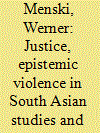

|
|
|
|
|
| Summary/Abstract |
This editorial article covers much more than Dalits and untouchability, because ‘caste’ itself is about life, similar to the inevitably related human constructs of ‘law’, ‘religion’, ‘society’, ‘culture’ and also ‘race’ and ‘gender’. This article and the contributions in this Special Issue will not resolve the ongoing turbulences over caste, but may be useful tools to identify avenues for more constructive debates, rather than acrimonious exchanges. The key argument of the present article is that while difference is part of the human experience everywhere, ‘caste’, however disagreeable, remains an ancient culture-specific component of the intensely plural current identity of South Asia and South Asians, wherever they may be in the world today. It seems impossible to deny, ban or abolish this entity, which continues to serve as an identity marker, often in efforts to resist ongoing discriminations. Academic debates thus need to develop more constructive and sophisticated methods in various current attempts to acknowledge the multivocal stances on ‘caste’ and to negotiate better justice rather than falling into traps of all kinds of phobias, old and new. Approaches which simply deny that caste still exists, posit that it can just be abolished or claim that it cannot ever be adequately debated are unhelpful and just increase the heat in existing chaotic and largely self-righteous discourses. The article suggests that ancient Indians seem to have known much more about diversity management than we care to admit, while messiness and chaos remain prominent all around us today. This is not idolising a glorious past, but critiquing the present chaos while searching for justice-conscious remedies in diversity management.
|
|
|
|
|
|
|
|
|
|
|
|
|
|
|
|
| 10 |
ID:
141220
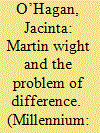

|
|
|
|
|
| Summary/Abstract |
In the ‘Disunity of Mankind’, Martin Wight addresses a recurrent dilemma in Western thought: how do we reconcile conceptions of human community with those of human diversity? The ways in which diversity is understood and the meanings attached to difference has significant implications for political orders and human interaction. The deployment of difference can generate both sites of contest, and the permissive conditions for particular forms of political action. Wight’s dilemma remains highly salient today. We continue to struggle intellectually, ethically and politically to reconcile claims of a universal human community with the plurality of human societies. Whilst we ostensibly value diversity, we still persistently constitute difference through producing dichotomies that generate both moral and political hierarchies and boundaries, which in turn form significant features in the landscape of contemporary world politics.
|
|
|
|
|
|
|
|
|
|
|
|
|
|
|
|
| 11 |
ID:
168824
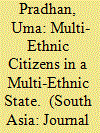

|
|
|
|
|
| Summary/Abstract |
In 1990, the Constitution of Nepal declared Nepal a multi-ethnic (bahujatiya) country. This newly transformed state promised better inclusion of marginalised groups through special provisions. How has this been operationalised, and what does this mean in practice for the members of the groups concerned? Drawing on fieldwork in the Nepal Foundation for Development of Indigenous Nationalities (NFDIN), this paper argues that the Nepali state’s moral and political obligation to address long-standing concerns about group-based inequalities has opened up intriguing new spaces to perform and redefine state–society relations. Within these new spaces, categories of difference are constantly invoked and experienced, where both the state and citizens come to co-constitute each other in a variety of new ways.
|
|
|
|
|
|
|
|
|
|
|
|
|
|
|
|
| 12 |
ID:
151177
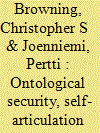

|
|
|
|
|
| Summary/Abstract |
The concept of ontological security has made increasing headway within International Relations, in particular through its ability to offer alternative explanations of the forces underpinning security dilemmas and conflict in world politics. While welcoming the insights already provided by its application, this article argues that the concept’s use to date has been too much geared to questions of identity-related stability, with change viewed as disturbing and anxiety-inducing. In contrast, the article calls for a more open understanding that: (i) links ontological security to reflexivity and avoids collapsing together the concepts of self, identity and ontological security; (ii) avoids privileging securitization over desecuritization as a means for generating ontological security; and (iii) opens out the concept beyond a narrow concern with questions of conflict and the conduct of violence more towards the theorization of positive change.
|
|
|
|
|
|
|
|
|
|
|
|
|
|
|
|
| 13 |
ID:
188698
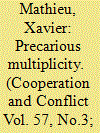

|
|
|
|
|
| Summary/Abstract |
This article investigates the portrayal by French policy-makers of the so-called Islamic State ‘foreign fighters’. I provide an in-depth analysis of the discursive construction of these ‘foreign fighters’ as different and detached from the (French) Self. I do so through a questioning of the notion of multiplicity, revealing how it exists precariously and the consequences this precariousness has on the notion itself. First, multiplicity emerges in ‘strange’ places as identities are being remodelled through new combinations. Second, the coexistence implied by multiplicity needs to be complexified to account for the way it helps preserve but also sometimes erase difference (and thus multiplicity itself). Finally, because of the precariousness of multiplicity, unexpected outcomes can be produced by the encounter with difference (such as the policy of non-repatriation of the ‘foreign fighters’). Overall, multiplicity can be usefully questioned by looking at these instances of instability and doubt. As such, this article shares the concerns expressed by critical scholars that multiplicity recreates problematic distinctions between inside and outside. As a response, my analysis contributes to an understanding of multiplicity as always in the making, revealing how various discursive strategies are used to temporarily and imperfectly stabilise boundaries.
|
|
|
|
|
|
|
|
|
|
|
|
|
|
|
|
| 14 |
ID:
185967
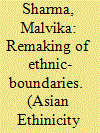

|
|
|
|
|
| Summary/Abstract |
Being an Ethnic-Pahari-Sikh-Borderlander in Poonch, Jammu and Kashmir is a phenomenon that adds to the discourse of ethnicity and nationalism. Partition of the Indian sub-continent in 1947 acted as a disruption in the socio-political history of the ethnic-community of Poonch generating difference and othering. This led to a newer set of challenges that re-imagines the concept of ethnicity altogether. Through an ethnographic account of the religiously assertive Sikh-identity in Poonch, this study asks the questions: Can the religious-reassertion of identities in a community render a concept as giant as ethnicity a myth? What happens to the historic origins of ethnic-bonds when identities begin to organise themselves exclusively on religious lines? Identities in Poonch exist at crossroads where being a religious Sikh challenge the idea of an ethno-geographic Sikh, both of them trying to co-exist under a bigger identity of being a borderlander.
|
|
|
|
|
|
|
|
|
|
|
|
|
|
|
|
| 15 |
ID:
182438
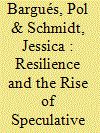

|
|
|
|
|
| Summary/Abstract |
This article explores the nature of resilience-informed international interventions today by thinking about ‘difference’. Up to the 1990s, international interventions were often characterised by a patronising tone in which backward others needed help to develop. Some 20 years later, key lessons learned were that others were so fundamentally different that efforts to assist them invariably failed. This article argues that contemporary approaches seeking to foster resilience are simultaneously propelled by both approaches. They are thus underpinned by two conflicting understandings of difference: the other that is in need and the other that cannot be attended. Even more, we contend that this contradiction is put to productive use in resilience-building: protracted crises today demand practitioners to ‘be there’, engaged permanently, to speculate, experiment, and affirm radical uncertainty. In order to analyse the novel features of resilience, we draw on Graham Harman’s speculative realism and look at policy programming of the Syrian refugee crisis.
|
|
|
|
|
|
|
|
|
|
|
|
|
|
|
|
| 16 |
ID:
179318
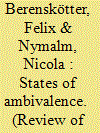

|
|
|
|
|
| Summary/Abstract |
This article revisits and revives the concept of ‘the Stranger’ in theorising international relations by discussing how this figure appears and what role it plays in the politics of (collective) identity. It shows that this concept is central to poststructuralist logic discussing the political production of discourses of danger and to scholarship on ontological security but remains subdued in their analytical narratives. Making the concept of the Stranger explicit is important, we argue, because it directs attention to ambivalence as a source of anxiety and grasps the unsettling experiences that political strategies of conquest or conversion, including practices of securitisation, respond to. Against this backdrop, the article provides a nuanced reading of the Stanger as a form of otherness that captures ambiguity as a threat to modern conceptions of identity, and outlines three scenarios of how it may be encountered in interstate relations: the phenomenon of ‘rising powers’ from the perspective of the hegemon, the dissolution of enmity (overcoming an antagonistic relationship), and the dissolution of friendship (close allies drifting apart). Aware that recovering the concept is not simply an academic exercise but may feed into how the term is used in political discourse and how practitioners deal with ‘strange encounters’, we conclude by pointing to alternative readings of the Stranger/strangeness and the value of doing so.
|
|
|
|
|
|
|
|
|
|
|
|
|
|
|
|
| 17 |
ID:
186576
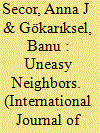

|
|
|
|
|
| Summary/Abstract |
This study takes a critical perspective on the making of sectarian difference and Alevi precarity in contemporary Turkey. Drawing on our research from 2013 to 2016, we present an analysis of stories and conversations that took place amongst Alevi and Sunni focus group participants, primarily in Istanbul. These conversations illustrate how sectarian difference can be made in the relations between neighbors as differences become coded as sectarian and taken up within systems of power and domination. At the same time, our research also shows how, in the entangled relations between neighbors, questions of ethics and mutual responsibility arise, though these relations sometimes become uneasy or even unbearable. Finally, we show how the question of “knowing” difference is taken up within a power-laden discourse of sectarianism, one that is tied to the history of Alevis (and others) in Turkey while also extending well beyond this context.
|
|
|
|
|
|
|
|
|
|
|
|
|
|
|
|
| 18 |
ID:
100757
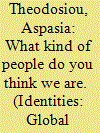

|
|
|
|
|
| Publication |
2010.
|
| Summary/Abstract |
In Parakalamos (a village in NW Greece) Gypsyness, historically constituted as a "disheveled otherness," claims a space of encounter with people and actions that are "other," but also arise from within, ossified, but also ephemeral and fleeting. By exploring the way Gypsies in Parakalamos discussed and experienced processes of identification, I shift the issue of Gypsy otherness away from the well-ordered schema of neatly divided communities usually found within Gypsy ethnography, and I am concerned with the scenography of Gypsy difference: drawing upon a more general discussion on stereotypes, identity, and difference, I explore the situatedness, instability and partial character of Gypsy performances of difference, which nonetheless cannot lie outside the topography of marginality in and through which Parakalamos Gypsies have emerged as particular historical subjects.
|
|
|
|
|
|
|
|
|
|
|
|
|
|
|
|
|
|
|
|
|